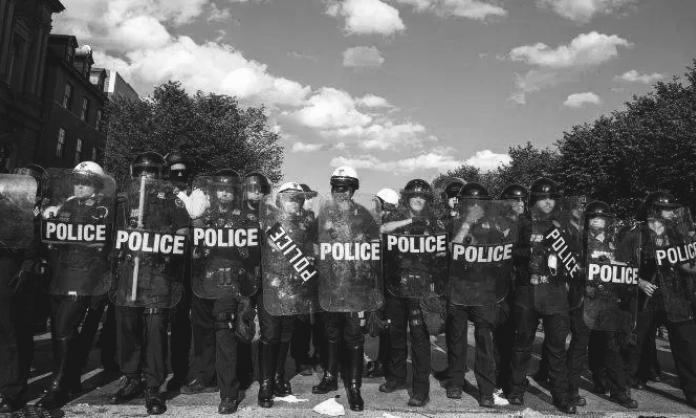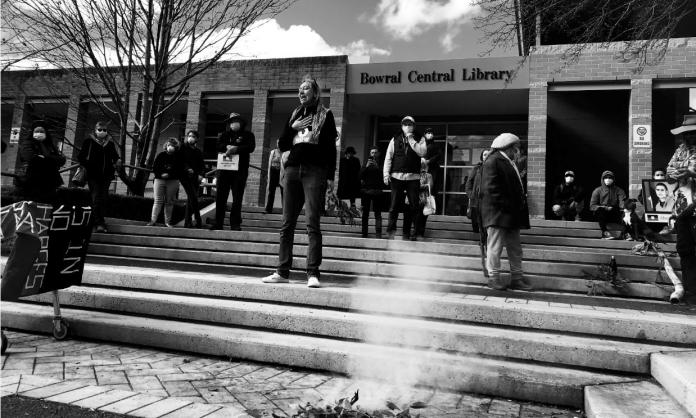“Defund the police”: what was once a fringe sentiment on the radical left is now being championed by everyone from activists radicalised by the current Black Lives Matter movement to politicians and Instagram celebrities. The slogan makes an important point: cops are greedy pigs.
In almost every society, police departments and prisons are gluttons for tax dollars, bloated on billions that could instead pay for schools, health care and transport. These services are often sacrificed so Officer Piggy can have some new “less-than-lethal” (often extremely lethal) weapons, or new prisons to throw migrants and the poor people into.
In response to the recent wave of rebellion, various municipalities across the United States have pledged to cut police budgets or redirect funds into other services. While the spotlight is rightly on how grossly inflated these budgets are, less attention has been given to police spending in Australia. Yet even according to research done by the Institute of Public Affairs—a hard-right Liberal Party thinktank Australia has one of the highest expenditures on police and prisons out of any country in the OECD. In 2017, $16 billion was spent on the criminal justice system, with $4 billion spent on keeping people in prisons, placing Australia fifth in OECD rankings. Today, add the state, territory and federal police budgets, plus the amount spent on corrective services, and the figure is closer to $19 billion. And with recidivism rates increasing in Australia—the national average stands at 45.6 per cent of prisoners released from prison who returned within 2 years, much higher for those released from juvenile detention and the amount spent on brutalising people is only set to increase.
So taking money away from cops is about ending the practice of ordinary people subsidising our own submission. But what would that look like in the Australian context?
Legal aid: In 2019, Legal Aid NSW developed a business case to hire private lawyers to help deal with the thousands of cases that don’t receive access to free representation due to funding shortages in community legal assistance. This would cost $60 million. Multiplying that for every state and territory and each of the 160,000 people who are turned away from legal centres each year might finally be able to have a fair trial.
Public housing: Five billion dollars a year buys us 40,000 public housing dwellings across the country, with costs decreasing each year as more public housing is built. If the entire $19 billion annual police and prison budget were put into housing, you could build 152,000 public housing dwellings. That would put a dent in Australia’s shortfall of 433,000 social housing places that has accumulated over the last a quarter of a century. Over three years, reallocating the police budget to housing could wipe out the whole backlog.
Mental health services: Instead of calling the police on those suffering mental health crises, only $1.1 billion would be needed to fully fund mental health services nationally, including crisis response teams, dedicated professionals and mental health research.
Education: The higher education sector recently announced a $9 billion shortfall due to coronavirus: the amount spent on policing the population could fully fund and expand the higher education sector, ensuring everyone had the opportunity to go to university for free and gain employment.
Indigenous health and wellbeing: Indigenous people continue to experience worse statistics when it comes to unemployment (4.2 times higher than the rate for non-indigenous people), housing (6 times more likely to live in underfunded social housing) and health, where things as simple as flouridating water in remote areas could prevent against a range of illnesses not experienced in non-indigenous communities. Instead of spending $19 billion a year on a system that renders Indigenous people some of the most incarcerated on earth, that money could go towards improving Indigenous lives.
This is but a small sample of what societies could achieve if we cut off the police. We could put money towards services and programs that prevent people from getting caught into the vortex of the criminal justice system in the first place.
Yet defunding the police is only half the story: the state pays cops not only to terrorise ordinary people but also to protect the status quo of capitalists exploiting workers for profit every day. Cops aren’t the only gluttons: capitalists live like parasites off the blood and sweat of workers every day. Defunding the police, then, should be part of a broader program of ending the privileges of the rich and their backers.











